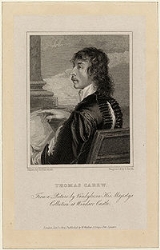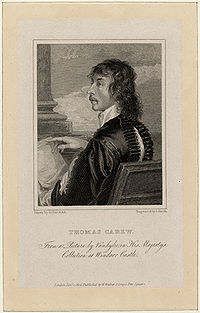
Thomas Carew
Encyclopedia

Biography
He was the son of Sir Matthew Carew, master in chancery, and his wife, Alice daughter of Sir John Rivers, Lord Mayor of the City of London and widow of Ingpen. The poet was probably the third of the eleven children of his parents, and was born in West WickhamWest Wickham
West Wickham is a place in the London Borough of Bromley, England. It is 10.3 miles south east of Charing Cross. West Wickham history dates back to early settlements existing since 1068, although the name `Wickham` is an indication of an earlier Anglo-Saxon settlement...
in London
London
London is the capital city of :England and the :United Kingdom, the largest metropolitan area in the United Kingdom, and the largest urban zone in the European Union by most measures. Located on the River Thames, London has been a major settlement for two millennia, its history going back to its...
, in the early part of 1595; he was thirteen years old in June 1608, when he matriculated at Merton College, Oxford
Merton College, Oxford
Merton College is one of the constituent colleges of the University of Oxford in England. Its foundation can be traced back to the 1260s when Walter de Merton, chancellor to Henry III and later to Edward I, first drew up statutes for an independent academic community and established endowments to...
. He took his degree of B.A. early in 1611, and proceeded to study at the Middle Temple
Middle Temple
The Honourable Society of the Middle Temple, commonly known as Middle Temple, is one of the four Inns of Court exclusively entitled to call their members to the English Bar as barristers; the others being the Inner Temple, Gray's Inn and Lincoln's Inn...
. Two years later his father complained to Sir Dudley Carleton
Dudley Carleton, 1st Viscount Dorchester
Dudley Carleton, 1st Viscount Dorchester was an English art collector, diplomat and Secretary of State.-Early life:He was the second son of Antony Carleton of Brightwell Baldwin, Oxfordshire, and of Jocosa, daughter of John Goodwin of Winchendon, Buckinghamshire...
that he was not doing well. He was therefore sent to Italy
Italy
Italy , officially the Italian Republic languages]] under the European Charter for Regional or Minority Languages. In each of these, Italy's official name is as follows:;;;;;;;;), is a unitary parliamentary republic in South-Central Europe. To the north it borders France, Switzerland, Austria and...
, as a member of Sir Dudley's household, and when the ambassador returned from Venice, he seems to have kept Thomas Carew with him, for he was working as secretary to Carleton, at the Hague
The Hague
The Hague is the capital city of the province of South Holland in the Netherlands. With a population of 500,000 inhabitants , it is the third largest city of the Netherlands, after Amsterdam and Rotterdam...
, early in 1616. However, he was dismissed in the autumn of that year for levity and slander; he had great difficulty in finding another job. In August 1618 his father died, and Carew entered the service of Edward Herbert, Baron Herbert of Cherbury, in whose train he travelled to France in March 1619, and it is believed that he remained with Herbert until his return to England, at the close of his diplomatic missions, in April 1624. Carew "followed the court before he was of it," not receiving the definite commitment of the chamber until 1628.
While Carew held this office, he displayed his tact and presence of mind by stumbling and extinguishing the candle he was holding to light Charles I
Charles I of England
Charles I was King of England, King of Scotland, and King of Ireland from 27 March 1625 until his execution in 1649. Charles engaged in a struggle for power with the Parliament of England, attempting to obtain royal revenue whilst Parliament sought to curb his Royal prerogative which Charles...
into the queen's chamber, because he saw that Lord St Albans had his arm round her majesty's neck. The king suspected nothing, and the queen heaped favours on the poet. Probably in 1630, Carew was made "server" or taster-in-ordinary to the king. To this period may be attributed his close friendships with Sir John Suckling
John Suckling (poet)
Sir John Suckling was an English poet and one prominent figure among those renowned for careless gaiety, wit, and all the accomplishments of a Cavalier poet; and also the inventor of the card game Cribbage...
, Ben Jonson
Ben Jonson
Benjamin Jonson was an English Renaissance dramatist, poet and actor. A contemporary of William Shakespeare, he is best known for his satirical plays, particularly Volpone, The Alchemist, and Bartholomew Fair, which are considered his best, and his lyric poems...
and Edward Hyde, 1st Earl of Clarendon
Edward Hyde, 1st Earl of Clarendon
Edward Hyde, 1st Earl of Clarendon was an English historian and statesman, and grandfather of two English monarchs, Mary II and Queen Anne.-Early life:...
; the latter described Carew as "a person of pleasant and facetious wit." John Donne
John Donne
John Donne 31 March 1631), English poet, satirist, lawyer, and priest, is now considered the preeminent representative of the metaphysical poets. His works are notable for their strong and sensual style and include sonnets, love poetry, religious poems, Latin translations, epigrams, elegies, songs,...
, whose celebrity as a court-preacher lasted until his death in 1631, exercised a powerful if not entirely healthy influence over the genius of Carew. In February 1633 a masque
Masque
The masque was a form of festive courtly entertainment which flourished in 16th and early 17th century Europe, though it was developed earlier in Italy, in forms including the intermedio...
by the latter, Coelum Britanicum, was acted in the Banqueting House at Whitehall, and was printed in 1634.
The close of Carew's life is absolutely obscure. It was long supposed that he died in 1639, and this has been thought to be confirmed by the fact that the first edition of his Poems, published in 1640, seems to have a posthumous character. But Clarendon tells us that "after fifty years of life spent with less severity and exactness than it ought to have been, he died with the greatest' remorse for that licence." If Carew was more than fifty years of age, he must have died during or after 1645, and in fact there were final additions made to his Poems in the third edition of 1651. Walton tells us that Carew in his last illness, being afflicted with the horrors, sent in great haste to "the ever-memorable" John Hales
John Hales
John Hales was an English theologian born in St. James's parish, Bath, England. As eminent divine and critic, his singular talents and learning have procured him by common consent the title of the "Ever-memorable".-Life:...
(1584–1656); Hales "told him he should have his prayers, but would by no means give him then either the sacrament or absolution."
Carew's poems are sensuous lyrics. They open to us, in his own phrase, "a mine of rich and pregnant fancy." His metrical style was influenced by Jonson and his imagery by Donne, for whom he had an almost servile admiration. Carew had a lucidity and directness of lyrical utterance unknown to Donne. It is perhaps his greatest distinction that he is the earliest of the Cavalier song
Cavalier song
Cavalier song is a Jacobean and Carolinian genre of song, a later equivalent to Elizabethan lute song. Many of the surviving examples were part of a large scale lavish court entertainment, the Stuart Masque...
-writers by profession, of whom John Wilmot, Earl of Rochester, was a later example, poets who turned the disreputable incidents of an idle court-life into poetry which was often of the rarest delicacy and the purest melody and colour. The longest of Carew's poems, "A Rapture," would be more widely appreciated if the rich flow of its imagination were restrained by greater reticence of taste. A testimonial to his posterity is that he was analyzed by 19th century critics such as Charles Neaves
Charles Neaves
Charles Neaves, Lord Neaves FRSE was a Scottish advocate, judge, theologian and writer. He served as Solicitor General , as a judge of the Court of Session, the supreme court of Scotland , and as Rector of the University of St Andrews .Neaves was known as one of the early analysts of the history...
, who even two centuries later found Carew on the sensuous border of propriety.
Critical reception
Carew has long been recognized as a notable figure in English literary history. His earliest critics—chiefly other poets—evidently knew his work from the many manuscripts that circulated. Among many others, two of the most celebrated writers of the age, Sir John Suckling and William Davenant, paid tribute to Carew, playfully admiring his poetic craftsmanship. Carew's reputation, however, experienced a slow but steady decline during the second half of the seventeenth century. Despite some interest in Carew in subsequent years, not until the twentieth century did critics offer a reexamination of Carew's place in English literary history. F. R. Leavis wrote in 1936: “Carew, it seems to me, has claims to more distinction than he is commonly accorded; more than he is accorded by the bracket that, in common acceptance, links him with Lovelace and Suckling.” More recently, Carew's place among the Cavalier Poets has been examined, as have his poetic affinities with Ben Jonson and John Donne; “A Rapture” has been scrutinized as both biography and fantasy; the funerary poetry has been studied as a subgenre; evidence of Carew's views concerning political hierarchy has been found in his occasional verseOccasional poetry
Occasional poetry is poetry composed for a particular occasion. In the history of literature, it is often studied in connection with orality, performance, and patronage. As a term of literary criticism, "occasional poetry" describes the work's purpose and the poet's relation to subject matter...
; and love and courtship have been probed as themes in the “Celia” poems. By the end of the twentieth century, Carew has been recognized as an important poet representative of his time and a master lyricist. According to Edmund Gosse, “Carew's poems, at their best, are brilliant lyrics of the purely sensuous order.

